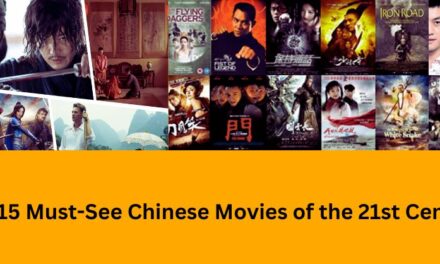11 Enlightening Documentaries on Philosophy and Religion

Philosophy and religion are two of the most profound subjects that humanity grapples with. These big questions about the meaning of life, ethics, the nature of reality and the existence of God have occupied humanity for thousands of years.
Documentary films are a powerful medium for exploring these complex topics in an accessible and engaging way. Unlike pure academic texts, documentaries can convey not just information but also emotion through cinematography, music, narration and interviews.
11 Documentaries to Illuminate Philosophy, Faith & the Meaning of Life
This article highlights 11 standout documentary films that offer insightful perspectives on various aspects of philosophy and religion. From an intimate portrait of one of history’s greatest philosophers to sweeping overviews of the world’s belief systems, these documentaries use the power of film to bring complex ideas vividly to life.
1. Examined Life (2008)
Examined Life is a unique documentary that takes philosophy out of the classroom and onto the streets. The film features a series of interviews with prominent contemporary philosophers including Peter Singer, Cornel West and Slavoj Zizek. But rather than sitting in an office or library, each philosopher discusses their ideas while walking through public spaces in different cities, from Manhattan’s garment district to the airport in San Francisco.
This simple premise creates a visually engaging way to make dense philosophical ideas feel grounded in everyday life. The philosophers touch on concepts like consumerism, ethics, transcendence and more while interacting with their bustling urban environments. Their insights are penetrating, but the informal settings make them feel spontaneous and accessible.
For anyone interested in modern philosophy or new ways of looking at contemporary life, Examined Life offers an exciting gateway into some of today’s most influential thinkers.
2. The Story of God (2016)
Acclaimed documentary filmmaker Morgan Freeman turns his curiosity to the world’s religions in the Nat Geo series The Story of God. With his instantly recognizable voice guiding the narratives, Freeman travels to some of the planet’s most spiritually significant sites to explore religious beliefs and rituals.
From Jerusalem’s Wailing Wall to Mayan temples deep in the Guatemalan jungle, each episode focuses on a different fundamental question like “Who is God?” or “Why does evil exist?” Freeman participates in practices and consults leading theologians, archaeologists, historians and experts from various faiths including Christianity, Islam, Judaism, Buddhism and Hinduism.
The cinematography brings the sacred sites vibrantly to life while Freeman’s inquisitive yet thoughtful approach creates space for viewers to reflect on humanity’s diverse expressions of faith throughout history. For audiences curious to learn more about religion and spirituality, The Story of God offers a spectacular global journey through the beliefs that give meaning to billions.
3. Into the Inferno (2016)
Prolific documentarian Werner Herzog teamed up with volcanologist Clive Oppenheimer to explore the innate human fascination with volcanoes in the visually arresting Into the Inferno. Filmed across incredible volcanic sites from Indonesia to Ethiopia, North Korea to Iceland, the film contemplates how these primal and destructive forces have shaped societies throughout human history.
Interviews with scientists reveal details of volcanic eruptions and tectonic movements that continually reshape our dynamic Earth. But Herzog is just as interested in the rich mythologies and spiritual meanings different cultures have attached to volcanoes, whether the pyramids of ancient Egypt or the ceremonially burning lava of the Vanuatu islanders.
With sweeping aerial photography and rare access inside active craters, Into the Inferno views volcanoes not just as geologic phenomena but as portals into humanity’s relationship with nature, creation myths and notions of apocalypse. The result is a meditation on how volcanoes stir primal awe and terror within our collective psyche.
4. The Buddha (2010)
This PBS documentary by award-winning filmmaker David Grubin offers an in-depth look at the life and teachings of the Buddha. Blending interviews with Buddhist scholars, archival artwork and immersive reenactments filmed in India, The Buddha paints a rich portrait of the philosopher’s world and his path to enlightenment. The film charts the major stages of his life, from his privileged upbringing as Prince Siddhartha in 5th century BCE Nepal to his ascetic quest for truth after encountering suffering for the first time.
Viewers gain insight into his “middle way” philosophy of moderation as well as key concepts like the Four Noble Truths and the Eightfold Path. Dramatic reenactments of scenes like the Buddha’s meditations under the Bodhi Tree add color to the biographical details. Interviews with modern practitioners highlight the global relevance of the Buddha’s teachings today.
Beautiful cinematography transports viewers to sacred Buddhist sites. For anyone interested in one of history’s most influential spiritual leaders, The Buddha offers an insightful look at his life and legacy.
5. The Power of Myth (1988)
This six-part PBS series documents reporter Bill Moyers’ conversations with influential mythologist Joseph Campbell. Drawing from Campbell’s seminal work The Hero with a Thousand Faces, the interviews explore how primal myths and archetypal stories illuminate stages of human consciousness and personal growth.
From the hero’s journey monomyth to metaphors of light versus dark, Moyers and Campbell touch on timeless themes found in mythology, literature and religious symbols across cultures. Interspersed with photographs of mythological artworks, the series brings Campbell’s conceptual frameworks vividly to life.
Thirty years later, The Power of Myth continues to provide insightful perspectives on humanity’s relationship with myth and our innate need for stories that instill life with meaning.
6. The Quantum Activist (2009)
At the intersection of new age spirituality and quantum physics lies The Quantum Activist, a documentary exploring how observation shapes reality. The film chronicles the work of scientist Amit Goswami and his hypothesis that according to quantum theory, consciousness has the ability to affect subatomic particles and therefore material reality.
This perspective leads Goswami to apply quantum principles to areas like creativity, healing, and explaining paranormal phenomena. Interviews with other quantum physicists, philosophers and spiritual leaders debate the implications of a consciousness-derived model of reality. By uncovering the cosmic connections between science and mysticism, Goswami attempts to integrate cutting-edge physics into a new paradigm for understanding the nature of existence.
Audiences interested in Eastern spirituality and mysticism will find The Quantum Activist an intriguing examination of how quantum principles might explain the power of spiritual practices that harness consciousness and intention.
7. Crazy Wisdom: The Life and Times of Chögyam Trungpa Rinpoche (2011)
This intimate documentary offers a raw portrait of the controversial Tibetan Buddhist teacher Chögyam Trungpa Rinpoche, one of the first teachers to bring Buddhism to the West. Born in Tibet, Trungpa fled Chinese occupation and helped pioneer the transplanting of Tibetan Buddhism’s ancient traditions to America in the 1970s. Renowned as a brilliant teacher, he was also notorious for drinking, womanizing and openly criticizing devotion to gurus.
The film interviews students who knew him and offers unprecedented access to his writings and teachings. A complex, sexually provocative figure who helped popularize meditation and establish Naropa University, the first accredited Buddhist college in North America, Trungpa exemplified the confrontation between Eastern spirituality and Western culture. Crazy Wisdom provides an unvarnished look at this influential teacher and the devotees who carry on his legacy.
8. Ram Dass, Going Home (2017)
Influential spiritual teacher, author and icon of the 1960s counterculture Ram Dass is now approaching the end of his life. In this intimate documentary, decades after his explorations of eastern philosophy and psychedelics, he returns to his childhood home on the east coast to reflect on his life’s journey thus far. Through conversations with close friends, followers and fellow seekers, Ram Dass explores aging, forgiveness, death and the cultivation of wisdom.
The themes that have defined his teaching for decades ― being present, facing mortality ― take on deeper resonance as he now lives them in his own declining health. Interweaving biographical details and archive footage with philosophical insights from his books like Be Here Now, the film offers a poignant portrait of a cultural pioneer reflecting on a well-lived life as he approaches its closing chapter.
Those familiar with Ram Dass’ work or interested in spiritual perspectives on death and dying will find much to contemplate in this moving documentary about acceptance, letting go and embracing the journey.
9. Art of Conflict: The Murals of Northern Ireland (2018)
The religious and political conflict that plagued Northern Ireland for decades is reflected vividly in the street art that emerged in Belfast and Derry during The Troubles. This documentary examines the history and meaning behind the thousands of vivid murals that still cover buildings across Northern Ireland.
The film reveals how these paintings became such a prominent art form by giving voice to communities during years of violence and served as monuments to those killed in the conflict. Artists share their experiences painting powerful partisan images while also using the murals to envision peace.
The role art plays in processing trauma and bridging divisions is a central theme. Interviews with former paramilitaries and prisoners uncover the deep emotions the murals could stir up. A symbol of both antagonism and reconciliation, this unique street art ultimately offers lessons in using creative expression to work towards healing.
10. My Scientology Movie (2015)
This unconventional documentary directed by acclaimed filmmaker Louis Theroux takes a provocative approach to exploring the controversial Church of Scientology. Stymied by the church’s notorious secrecy, Theroux turns the camera on former senior members and church critics like Mark Rathbun, getting them to audition actors to recreate incidents they experienced.
This creative methodology generates revealing insights into the alleged abuses and dysfunctions within Scientology under leader David Miscavige. The confrontational style results in the church constantly harassing and investigating Theroux and his crew as they dig into rumors of corporal punishment and indoctrination. Tensions build as the lines between documentary subject and director begin to blur.
As church spies monitor the production, Theroux becomes ensnared in the same intimidation tactics Scientology allegedly uses to discredit critics. This stylized exposé offers a rare view into the inner and outer workings of the intensely private organization.
11. The Pervert’s Guide to Ideology (2012)
Provocative Slovenian philosopher and cultural critic Slavoj Žižek applies his distinctive psychoanalytic lens to the hidden ideologies embedded in iconic films. As he inhabits famous movie sets, from Oz to the Bates Motel, Žižek’s sharp monologues decode how ideas about capitalism, patriotism and more are transmitted through mass media.
Ranging from They Live to Taxi Driver, he uses each film’s imagery to expose the subtle ways ideology can manipulate us. Offering an unconventional crash course in Žižek’s radical leftist thought, The Pervert’s Guide to Ideology is a mind-bending exploration of political messages concealed within our popular culture.
Conclusion
The immersive power of film allows these documentaries to bring the ideas and controversies surrounding philosophy and religion to life in ways books cannot.
From getting an intimate view inside specific faiths and sects to watching philosophers apply their conceptual frameworks to real-world issues, these films showcase documentary’s ability to educate, expand perspectives and inspire self-reflection. Whether providing sweeping overviews of the world’s belief systems or peering intimately into the lives of great thinkers and teachers, these documentaries offer insightful journeys to illuminate some of the most challenging yet essential questions at the heart of human existence.
For anyone seeking a deeper understanding of philosophy, spirituality and what some of civilization’s brightest minds have concluded about our search for truth and meaning, these compelling films are an ideal place to start exploring.









